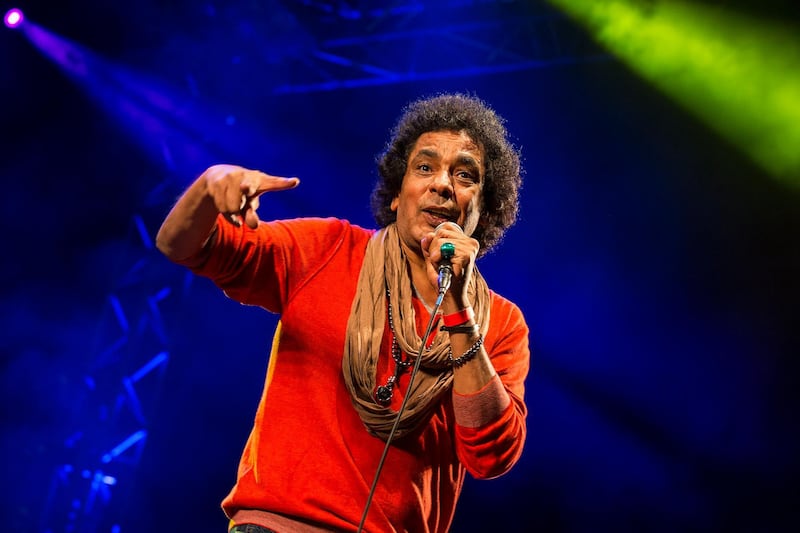Expect a vibrant gig when Mohamed Mounir performs tomorrow night at the Dubai Media City Amphitheatre.
The affair should be another occasion for the veteran Egyptian singer, known as The King, to showcase his alluring blend of polished folk and North African blues.
But don't let the concert's freewheeling spirit fool you: the 63-year-old is a professional, even if he often doesn't look the part. Where peers such as Amr Diab and Fares Karam strive to defy time with each photo shoot and music video, Mounir is content to age naturally and gracefully, from crinkly eyes to those unbridled curls.
You would also be hard-pressed to find Mounir performing in a slick suit; a loose shirt and jeans or a tracksuit is often his preferred stage uniform. However, when it comes to his ear, the man is sharp. I witnessed this first-hand five years ago in the Moroccan capital of Rabat. Mounir arrived an hour late to his soundcheck before his headlining performance at the Mawazine festival. He wandered gingerly onto the stage in what looked like pyjamas and flip-flops, and tested his voice on the speakers.
After listening for a few minutes, he suddenly signalled the band to halt mid-song, administered a series of blistering commands and re-arranged the piece on the spot before promptly heading back to his hotel – the track's added funk infusion went down a treat that night in front of a 30,000-strong crowd.
It is that old-school approach that has always defined Mounir’s work.
Born in Egyptian city Aswan, Mounir and his family headed to Cairo as part of the immigration of Egypt's Nubian community during the construction of the High Dam. Despite graduating with a media degree from Helwan University, Mounir fancied himself as a singer.
After a few low-key covers gigs, he teamed up with Egyptian poet Abdel Reheem Mansour and the great Nubian composer Ahmed Mounib. With the jazz musician Yehia Khalil in tow, the group went on to give Mounir an expansive new sound.
Early albums such as 1977's Alemony Eneeki and the critically acclaimed Shababeek was full of the orchestral flourishes that was a hallmark of Egyptian pop at the time, but it was tempered with a throbbing groove of North African music, and in some cases lyrics sung entirely in the indigenous language of
the Nubians. On top of that sonic brew was Mounir recognisable voice: resonant yet high on register; elastic yet clear in diction.
That down-to-earth manner and his rustic good looks landed him movie roles in high profile films such as 1986 period drama Al Yawm Al Sadis (The Sixth Day), 1989's thriller Eshtebah (Suspicion) and historical epic Al Maseer (The Destiny), which had its premiere at the Cannes Film Festival.
With Mounir's eclectic sounds, from spiritual album Al Ard Wel Salam to performing the theme song for popular Egyptian cartoon Bakkar and occasional pop hits such 2003's Shamandora and 2012's Ya Hamam, the Egyptian press were confounded by his unique approach.
What Mounir views as art, regional critics viewed as erratic, hence his reticence to do interviews. Despite all the sonic changes, however, Mounir’s lyrics always stayed true to its social roots and humanitarian concerns.
This is what made 2011's anguished Ezzay (How?) so powerful. Widely regarded as the first anthem of the Egyptian revolution, Mounir's lyrics eschewed direct political attacks and instead addressed Egypt itself: "Had I loved you out of choice, my feelings would have changed a long time ago/ I swear by your name, to keep changing you 'til you accept me the way I am."
Mounir concerns for the common man have never changed. The day after his performance at Mawazine, I almost knocked him over as he came out of an elevator in a hotel. While refusing to conduct an interview, he was interested in discussing my native country of Eritrea and its refugee situation.
Sensing that I perhaps needed a quote for my report, he sighed and stated: "I enjoy what I do and I am happy that I am still able to reach the people after all these years. That's all you can really hope for in the end."
And with that, he strolled out of the hotel to his waiting car, but not before greeting the hotel's cleaning staff and bellboys, smiling and posing with them for a slew of selfies.
Mohamed Mounir performs on Friday night at the Dubai Media City Amphitheatre. Doors open from 5pm and tickets cost from Dh195 from dubai.platinumlist.net
______________
Read more:
[ Cairokee and Tania Saleh to headline the Wasla Festival ]
[ Sharjah World Music Festival: Syrian exile Racha Rizk on how her roots still define her ]
[ Egyptian indie singer and actor Maryam Saleh on her new super group and distinct vocal style ]
______________






